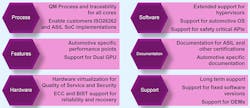Imagination’s PowerVR Series8XT-A GPU core takes aim at the digital cockpit and advanced driver-assistance systems (ADAS) thanks to features like hardware virtualization, which can provide quality-of-service (QoS) support (see figure). The company’s latest release highlights five essential elements: hardware IP, software, tools, documentation and long-term support.
The CPU platform targets systems-on-chip (SoCs) that can achieve the ASIL-levels of functional safety, meeting industry standards such as ISO 26262 and IEC 61506 at the system level. This is where Imagination’s long-term support (LTS) packages for 10 years and beyond come into play. PowerVR IP has been utilized by automotive applications processor vendors including DENSO, Renesas, Socionext, Texas Instruments, and others.
Imagination’s PowerVR Series8XT-A GPU offers features like hardware virtualization that bring quality-of-service (QoS) support along with ASIL certification.
Dominique Bonte, vice president of vertical markets, ABI Research, says: “The speed of progress in automotive is finally approaching that of Imagination’s traditional markets, such as mobile. Imagination’s dedicated PowerVR Automotive suite will allow automotive semiconductor vendors to accelerate time to market in terms of supporting automotive requirements like functional safety, virtualization, and power optimization through a turnkey solution.”
The PowerVR Series8XT-A is based on Imagination’s Furian architecture. The virtualization and hypervisor support enable service isolation. Guaranteed quality-of-service (QoS) support is possible even with a single GPU. Many systems require multiple GPUs to address service isolation when a mix of safety critical and non-safety critical applications run on the same SoC. Using a single GPU in this environment can reduce system costs.
The architecture is designed to work with error-correcting code (ECC) and error-detection code (EDC) memory and data-movement support. The IP includes logic built-in self-test (LBIST).
The Series8XT-A GPU is designed to mesh effectively with the PowerVR Series2NX NNA neural-network accelerator for machine-learning (ML) support. ML is key to advanced ADAS and self-driving car support. The GPU also has OpenGL capability.


